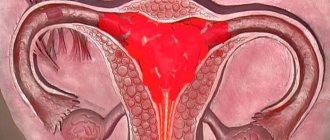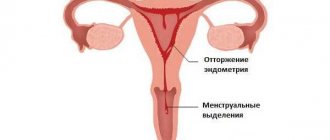Delayed menstruation, the main reasons other than pregnancy. Normally, the menstrual cycle lasts from 21 to 35 days. For each woman, its duration is individual, but for most of them, the intervals between menstruation are equal or differ from each other by no more than 5 days. You should always mark the day your menstrual bleeding begins on your calendar so that you can spot cycle irregularities in time.
Often, after stress, illness, intense physical activity, or climate change, a woman experiences a slight delay in menstruation. In other cases, this sign indicates pregnancy or hormonal disorders. We will describe the main reasons for delayed periods and the mechanism of their development, and also talk about what to do in such a situation.
Amenorrhea
In the medical world, late or absent periods are called amenorrhea. It is divided into two categories:
- Primary amenorrhea. This is a condition in which a girl has not started her period by the age of 16. Often primary amenorrhea is associated with the presence of congenital disorders that did not manifest themselves in any way until the onset of puberty. These are, for example, genetic or chromosomal abnormalities, problems with the organs of the reproductive system, etc. These may include being born without a uterus, or a uterus that does not develop normally.
- Secondary amenorrhea. This is a condition in which periods suddenly stop and are absent for more than three months. Those. I used to have periods, but now they are absent. Secondary amenorrhea is the most common form of missed period. The most common causes of this condition are pregnancy, problems with the ovaries (for example, polycystic ovary syndrome or early menopause), pituitary tumors, stress, serious violations of normal body weight (both smaller and larger), and others.
In addition to amenorrhea, there is another medical term that I want to introduce you to - oligomenorrhea. This is a disorder in which the duration of the menstrual cycle significantly increases and the duration of menstruation itself decreases. It is generally accepted that a woman has oligomenorrhea if during the year she had periods less than 8 times and/or lasted up to 2 days or less.
Reasons for delayed menstruation other than pregnancy
A delay in menstruation can be the result of physiological changes in the body, as well as be a manifestation of functional failures or diseases of both the genital and other organs (“extragenital pathology”).
Normally, menstruation does not occur during pregnancy. After childbirth, the mother’s cycle is also not restored immediately; this largely depends on whether the woman is lactating. In women without pregnancy, an increase in cycle length may be a manifestation of perimenopause (menopause). Irregularity of the cycle in girls after the start of menstruation is also considered normal, if it is not accompanied by other disorders.
Functional disorders that can provoke disruption of the menstrual cycle are stress, intense physical activity, rapid weight loss, previous infection or other acute disease, climate change.
Often, an irregular cycle with a delay in menstruation occurs in patients suffering from gynecological diseases, primarily polycystic ovary syndrome. In addition, such a symptom can accompany inflammatory diseases of the reproductive organs, occur after termination of pregnancy or diagnostic curettage, after hysteroscopy. Ovarian dysfunction may be caused by pathology of the pituitary gland and other organs that regulate a woman’s hormonal levels.
Of the somatic diseases accompanied by possible menstrual irregularities, it is worth noting obesity.
Periods of a woman's life after 40
After forty years, many women begin to experience suppression of their reproductive function. The process of menstrual irregularities is divided into several stages:
- Premenopausal stage.
- Menopause.
- Postmenopause.
Perimenopause combines premenopause, menopause, and 2 years after the last normal menstruation.
Menopausal transition period
The main cause of menstrual irregularities after 40 years of age is premenopause. It begins at the age of 40–45 years and lasts until the end of menstruation. It is characterized by the beginning of a decrease in the activity of the hormonal function of the ovaries and the appearance of primary symptoms of menopause. This period passes unnoticed for only 5–10% of women.
Menopause
At the age of 45, menstrual irregularities caused by premenopause move to the next stage - menopause, which occurs with the last normal menstruation after 45 years and lasts a year.
Menopause in a woman’s life is premature if it begins at 37–40 years old, early – at 41–45. This stage may occur a couple of years earlier due to smoking, fasting, or alcohol addiction.
Perimenopause
It begins at the age of 40–45 and ends by the age of 55. This age is characterized by a decrease in ovarian function associated with the aging of the reproductive system. The perimenopause phase includes perimenopause, menopause and the 2 subsequent years.
Postmenopause
This stage begins from menopause, that is, after the onset of the last normal menstruation, as well as for 1 year after it. The postmenopausal stage is observed up to 65–70 years, gradually flowing into the senile period.
List of reasons that may cause a delay in menstruation
A delay of 2 to 5 days in the “red days of the calendar” should not be a cause for concern, since this is considered a very real phenomenon for every woman. If pregnancy is excluded, then such disorders of the female body can be caused by many factors. Their careful analysis allows us to determine the cause of a gynecological or non-gynecological nature.
So, we list the top 15 reasons for missed periods:
- Polycystic ovary syndrome;
- Uterine fibroids;
- Endometriosis;
- Inflammatory diseases;
- Hormonal contraceptives;
- Diagnosis of the uterine cavity, abortion or miscarriage;
- The period after childbirth;
- Puberty;
- Menopausal disorders;
- Great physical activity;
- Stressful conditions;
- Environmental climatic conditions;
- Body weight abnormalities;
- Intoxication of the body;
- Taking certain medications;
- Hereditary predisposition.
As follows from all of the above, the reasons for regularly recurring delays of critical days are multifaceted. Biological clocks can go wrong even in nulliparous women, who often confuse the symptoms of menstrual irregularities with pregnancy. An inconsistent menstrual cycle should not be considered a particularly dangerous, serious illness, but it is still worth paying close attention to the frequency of your critical days.
Why menstruation is delayed in women over 40
Menstruation first begins during adolescence.
Afterwards, the woman begins a long reproductive period, and then menopause begins. The reasons for delayed periods after 40 years mainly come down to the development of menopause and rapid hormonal changes that are associated with age-related changes. By the age of 43-45, manifestations of menopause begin. Until the age of 40, menopause cannot be formed.
A symptom of menopause is long delays that will be present until menstruation completely disappears. Possible pathological processes cannot be excluded. In case of delays, diagnostic testing is required.
Teenagers start having periods around 12-14 years of age.
What is considered to be a delay?
Delay is a violation of the cycle, which is characterized by the absence of discharge. Duration may vary. Girls of different age categories are susceptible to deviation.
You should talk about a delay when your period is absent for 10 days. If the period is shorter, then there is no need to worry and the reason that there is no menstruation may lie in physiological reasons. In this case, significant complications will not arise.
What are the pathological root causes of delay?
It is upon reaching 40-44 years that a woman’s immunity significantly decreases. This is due to various age-related changes. The risk of pathological processes increases.
The female body is sensitive to various factors. The disease can affect the stability of the menstrual cycle. The probable causes of delay after 40-44 years are presented in the table.
| Diseases of the reproductive system | Such pathologies include cystic formations, the presence of cancerous tumors, adnexitis, myomatous nodes. These are the main factors leading to the absence of menstruation. |
| Pathologies of the endocrine system | In case of delays, it is necessary to exclude elevated blood sugar levels, inflammatory processes in the adrenal glands and thyroid gland, and insufficient synthesis of hormones by the sex glands. |
| Respiratory system disorders | Delays can also occur as a result of pneumonia, bronchial asthma, influenza, and acute respiratory viral infections. Menstruation can appear even after these abnormalities are eliminated. In this case, the violation is a consequence of taking potent medications or a decrease in the body’s protective functions. |
| Diseases of the heart and blood vessels | It is after 40 that women are highly susceptible to developing diseases of the cardiovascular system. There is a high risk of atherosclerosis, arterial hypertension, varicose veins, etc. These pathologies impair the performance of the entire body. There is an increased risk of development and delay against this background. |
| Body mass | The disorder manifests itself in both obesity and anorexia. |
The most serious disease associated with delay is cancer. This pathology can be asymptomatic for a long period. A complete cure may not be possible. Without treatment, the risk of death is high.
Cycle disturbances may be due to oncology
What are the psychological reasons
The psycho-emotional state has the greatest influence on the menstrual cycle. Under the influence of negative factors, delay can occur at any age. The main root causes of deviation include:
- stressful situations;
- emotional outbursts as a result of strong positive or negative shocks;
- mental stress.
After 40, you should rest as much as possible and try to alternate mental stress with physical stress. If basic recommendations are not followed, cycle disruption and delay will occur.
Even the most trivial reasons can lead to the absence of menstruation. This could be a change in climate or place of residence, experiences before a crucial event, etc.
What other reasons could there be
Regardless of age, women are strictly prohibited from lifting weights. This can lead to uterine displacement or other gynecological pathologies. Even one excessive physical activity is enough to cause problems.
It is better to avoid fatty fried foods
Nutrition plays a significant role. Women who add excessive quantities of fatty, fried, peppered, spicy, salty, pickled, canned foods, as well as confectionery, coffee, sauces, and sweet sodas to their diet are most susceptible to delays.
Another probable reason is the presence of bad habits. If you want to avoid the disappearance of menstruation, you should give up nicotine, drug or alcohol addiction. Otherwise, the functionality of the reproductive system will sooner or later be impaired.
The first thing women suspect when there is a delay is pregnancy. That is why, if there are no critical days for a long time, you should use a special test as early as possible.
However, it is worth noting that after 40, especially 45-47 years, a woman’s reproductive function gradually declines. The likelihood of successful fertilization is significantly reduced.
This root cause is extremely rare.
Abortion or other interventions also lead to deviation. It takes some time for the female body to recover. Usually, delays only bother you for the first two months.
Nutrition affects menstruation. Disorders are encountered by women who prefer monotonous diets or go hungry for a long period of time. The diet should be balanced and include all the required nutrients.
To avoid delays, nutrition should be complete
It is important to eat a varied diet. A meager diet leads not only to irregular periods, but also to a general deterioration in well-being. A woman's appearance deteriorates.
What is the main reason
The most important reason for failures is the onset of menopause. Menopause, as a rule, begins to form at 44-47 years of age. It is at this time that the first symptoms appear, which significantly reduces the woman’s quality of life.
Menopause is not a pathology, but a physiological process that is associated with age-related changes. There is a decline in the functioning of the ovaries. Rapid hormonal changes begin. Gradually, a condition will develop in which the woman will no longer be able to become pregnant and bear a child.
Menopause is characterized by active aging. The condition of the skin and hair worsens. New wrinkles appear. Menopause occurs in three phases:
- premenopause;
- menopause;
- postmenopause.
Delayed periods and their cessation are characteristic of menopause
Delays are likely only at the premenopausal stage. Menopause is diagnosed when there are no periods for a year.
Symptoms of menopause include:
- drowsiness;
- weakness;
- dryness in the vagina;
- decreased performance;
- decreased libido;
- sleep disturbance.
In this case, the delays are initially short and last 5-10 days. Gradually, periods disappear for 1-6 months. Only over time, menstruation disappears completely and will never be restored.
Women often experience increased body weight during menopause, and discomfort during sexual intercourse.
What diagnostics
There are many reasons that lead to deviation. The true root cause is determined only through diagnosis. First of all, the doctor performs an external examination. An anamnesis is being collected.
Your doctor may order an MRI
The woman is given directions to:
- clinical blood and urine analysis;
- blood test for hormonal panel;
- biochemical blood examination;
- Ultrasound and MRI.
The results obtained are analyzed. If necessary, complex treatment is prescribed on an individual basis.
What treatment
Treatment measures directly depend on the main diagnosis. Sometimes taking medications is not necessary. It’s enough just to review your diet and adjust your lifestyle. Regardless of the diagnosis, girls are recommended:
- give up fatty, fried, pickled, salty, canned foods;
- give preference to moderate physical activity;
- alternate rest and exercise;
- get enough sleep; avoid stressful situations.
In this video you will find possible reasons for the delay:
Nutrition should be healthy and balanced. Upon reaching 40 years of age, a woman’s immune performance decreases.
Drugs are selected taking into account the diagnosis and individual characteristics. Sometimes surgery is required. This is usually necessary in the presence of various types of neoplasms.
Do not ignore the present delay. It is necessary to undergo diagnostics and follow the doctor’s recommendations.
Source: https://mesyachnie.com/zaderzhka/prichiny-posle-soroka-let.html
Stress and physical activity
The most common causes of missed periods, besides pregnancy, are various nervous tensions, stress, and the like. Difficult work environment, exams, family problems - all this can cause a delay. A woman’s body perceives stress as a difficult life situation in which a woman should not give birth yet. It is worth taking care of changing the situation: contact a family psychologist, change jobs, or learn to relate to the situation more simply, and the like. Keep in mind that overwork and lack of sleep are also very stressful for the body.
Excessive exercise also does not contribute to the regularity of the menstrual cycle. It is known that professional athletes often experience problems with delayed periods and even with childbearing. The same problems plague women who take on physically demanding jobs. It's better left to men.
But don’t think that moderate exercise or morning jogging can affect the situation. An active lifestyle has never bothered anyone. We are talking specifically about excessive loads under which the body works for wear and tear.
What is menstruation and why can it be delayed?
The menstrual cycle is a periodic change in the body of a woman of childbearing age, aimed at preparing for conception. For most, the cycle is equal to the duration of one lunar month - 28 days. Its minimum duration is 21 days, maximum – 35 days.
The cycle includes 4 phases:
- Menstrual. The first day of the menstrual cycle corresponds to the first day of menstruation. During menstruation, the uterus sheds the top layer of the endometrium. The process lasts up to 7 days.
- Follicular. This phase begins simultaneously with the previous one, but its duration is about 2 weeks. During this period, the follicle matures, from which a new egg will be released. The second half of the phase is also devoted to endometrial renewal.
- Ovulatory. A short-term phase lasting about two days. At this time, the follicle that has matured in the ovary ruptures and releases the egg. The ovulatory stage may be accompanied by painful sensations.
- Luteal. The luteal phase lasts from the middle to the end of the cycle. During this period, the body prepares for possible conception by producing all the necessary hormones. The end of the phase may be accompanied by PMS due to the high concentration of hormones in the blood.
The duration of each phase is individual for women, but a clear periodicity must be maintained. It is important to keep a calendar to mark the first day of each menstruation. This way you can find out the duration of the cycle.
If your period does not come on time, there may be many reasons for this:
- pregnancy;
- diseases of the reproductive system;
- somatic diseases;
- menopause;
- stress;
- hormonal imbalance;
- excess or underweight;
- excessive physical activity;
- taking medications;
- poor nutrition.
Inflammatory diseases of the uterus
Inflammatory diseases of the uterus and ovaries lead to disruption of the production of hormones that are responsible for the processes of maturation of eggs, follicles, and endometrium. As a result, they are often the cause of delay. At the same time, the volume and nature of the discharge changes, pain appears in the lower abdomen, lower back, and other symptoms.
Often, inflammatory processes are the cause of infertility, tumors of the reproductive system, and mammary glands. Inflammatory diseases occur due to infection due to improper hygienic care of the genitals, unprotected sexual intercourse, traumatic damage to the uterus during childbirth, abortion, and curettage.
Birth control pills
If you are taking hormonal birth control pills, it is possible that your menstrual cycle will be significantly different from normal. Very often, the duration of cycles when taking birth control pills increases significantly. Some pills do not have this effect. Menstruation occurs as usual, but most often it is lighter and shorter. It is also worth noting that in very rare cases the pill may not prevent pregnancy, especially if it is missed. However, even if you took the pills accurately and correctly, if your period is late and you are worried about it, you can take a pregnancy test to calm down.
Nowadays you can find a fairly large number of different birth control pills on sale. Some of them may differ significantly in their effects on the body. In addition, it is worth noting that each individual woman can react differently to the same pills.
Also, keep in mind that when you stop using birth control pills, you may not have a normal menstrual cycle right away. For most women, the recovery period takes from one to two months, and sometimes this period can last up to six months. Only then will you be able to conceive a child again. Accordingly, during the recovery period you may also have an irregular cycle, and this must be taken into account if you have a delay.
All about menstruation in women after 40 years: what they are, normal and deviations
Approaching the age of 40, most women notice that undesirable changes occur in the body.
Feeling worsens, vigor and optimism are replaced by fatigue and depressed mood. The reasons for all this are the decline of reproductive function and hormonal changes.
The number of produced eggs decreases, the ratio between progesterone and estrogens changes.
A phenomenon that does not go unnoticed by any woman is irregular periods after 40 years and a change in the amount of bleeding. In some women, ovarian or uterine diseases are added to hormonal imbalance. Age-related changes can provoke polymenorrhea, bleeding, delay and other disorders.
Normal menstruation after 40 years
This age period is characterized by delays in menstruation, lengthening and shortening of the cycle. It also happens that spotting occurs 2 times a month.
They can be abundant or scanty, and under certain conditions doctors consider this to be normal. However, we cannot exclude pathologies that also cause all of the above phenomena.
After 40 years, a woman should monitor her periods very carefully, paying attention to their intensity, duration, color and consistency.
What menstruation may indicate a deviation from the norm:
- Abundant. In rare cases, heavy bleeding is a sign of perimenopause. Possible pathologies are cancer, endometriosis, uterine fibroids.
- Delayed. Symptoms of incipient menopause or a sign of pregnancy, which can occur after 40 years.
- Scarce. The cycle is extended to 35-40 days or shortened to 19-21 days. With scanty periods, the reason after 40 years is usually the approach of menopause.
- Frequent. Bleeding twice a month or between menstrual periods is called polymenorrhea. The reason is the decline of ovarian function and the production of a small amount of estrogen. Sometimes polymenorrhea indicates cervical cancer, endometriosis or a cyst.
- Long lasting. Menstrual bleeding that lasts a week or longer is a reason to see a doctor immediately. Long periods occur with blood clotting disorders, infectious diseases, pathologies of the ovaries and uterus. Taking oral contraceptives can also cause a prolongation of the menstrual period.
Cycle failure after 40 years: options for menstruation disorders
After reaching a certain age, a woman’s ability to conceive decreases every year. While the menstrual cycle has not completed, it is still possible to conceive, carry and give birth to a child. If menstruation fails after 40 years, the likelihood of such an event is reduced to a minimum. However, this does not eliminate the need to take contraceptives or use barrier methods.
There are different types of menstrual irregularities. Most often, doctors diagnose the following:
- heavy bleeding without irregularity;
- shortened cycle, when menstruation occurs once every 1.5-2 weeks;
- prolonged scanty bleeding (smearing continues without interruption);
- bleeding occurs after or before menstruation, as well as instead of the main menstruation;
- scanty discharge;
- cycle delay in the absence of pregnancy.
After 40 years, any of these phenomena is a reason for medical consultation. There are other symptoms of perimenopause. For example, before the onset of menstruation, a woman feels a worsening mood, experiences irritability, dizziness, headache, and palpitations. This is how the body reacts to the decline of ovarian function and hormonal imbalance, accompanied by endocrine changes.
When a deficiency of female sex hormones occurs in the body, the cyclical processes underlying menstruation are disrupted. As a result, delays are observed, periods become long, short, heavy, scanty, or continue for a whole month in the form of a spot.
Causes of scanty periods in women over 40 years of age
When the hormonal system fails, the endometrium, the protective membrane that covers the uterine cavity from the inside, suffers. With each monthly cycle, the thickness of the mucous layer becomes thinner. This makes the uterus vulnerable to infection and causes the amount of bleeding to decrease each month. At this time, it is important to undergo an examination by a gynecologist.
If there are no gynecological diseases, there is nothing to worry about. Scanty periods are a sign that perimenopause will soon give way to menopause. However, if the phenomenon continues for several months, in addition to examination, hardware diagnostics may be necessary. Some pathologies of the reproductive sphere can only be identified in this way. Here's how spotting and spotting can appear:
- instead of normal menstruation, at the appointed time;
- during the intermenstrual period, before and after menstruation.
You need to see a doctor as soon as possible, because timely detection of pathology significantly increases the chances of a successful treatment outcome.
Spotting instead of menstruation
The regularity of the menstrual cycle must be monitored every month. A woman can mark a calendar, use an app, or use another method. It is important to be able to conveniently monitor the duration, intensity and frequency of discharge.
Common causes of scanty menstrual bleeding:
- consequences of a previous infection (flu, sore throat, pneumonia, otitis media);
- the body's reaction to physical overload, stress and nervous tension;
- endometriosis of the uterus or ovaries, fibroids, cysts, hyperplasia;
- pathologies in the appendage area, loss of hormonal function of the ovaries;
- a sharp increase or decrease in body weight caused by illness, dieting, or the transition to a normal diet after a weight loss course;
- exacerbation in women with thyroid pathologies, diabetes mellitus;
- deterioration of the condition with chronic adnexitis;
- disruption of the kidneys, liver, pancreas;
- pregnancy.
The latter option cannot be called a typical reason for the absence of menstruation in women after 40 years of age, but it should not be excluded.
If your last period was scanty or spotty, you should be examined by a gynecologist and take a pregnancy test. Many women over 40 are able to carry and give birth to a healthy baby.
In this case, severe pathologies should be excluded and make sure that the development of the fetus is not in danger.
Spotting after menstruation
Spotting after menstruation almost always indicates illness. Gynecological disorders in which spotting is observed:
- precancerous condition;
- erosion of the cervical canal, inflammation;
- ovarian cyst;
- adenomyosis;
- endometritis;
- polyp in the uterus or cervix.
Why do you have long periods after 40?
Hormonal changes are often accompanied by heavy, prolonged and frequent menstrual flow. Instead of once a month - 2-3, each time for several days. The condition is difficult to tolerate, and concomitant diseases may develop against its background. It is necessary to identify the cause as quickly as possible, since severe blood loss is dangerous to a woman’s health.
Typical causes of frequent and prolonged periods in women over 40 years of age:
- polyps in the uterus;
- endometrial hyperplasia;
- complication of endometriosis;
- formation of a malignant tumor;
- atypical changes in endometrial tissue that developed against the background of a hyperplastic process;
- intramural or submucosal leiomyoma;
- other pathologies of the reproductive organs.
Heavy and prolonged menstruation cannot be treated using traditional medicine methods. In the case of a precancerous condition, such negligence can lead to the development of a malignant tumor.
How to stop heavy periods
Vaginal or uterine bleeding cannot be stopped on your own. There are several methods, but which one to use for a heavy menstrual cycle in a woman over 40 years old is decided by the gynecologist. Possible options:
- taking hormonal medications;
- use of hemostatic drugs;
- scraping.
The latter method is used when you need to obtain information about the condition of tissues. A sample of the material is sent for histological examination. Based on the results, treatment is prescribed.
Why do I get my period twice a month?
Normally, critical days should occur every 21-25 days. Small deviations in one direction or another are not considered pathology. However, a frequency of 2 times a month requires medical consultation. It does not matter whether the discharge is heavy or scanty, or whether it is accompanied by pain, weakness or other symptoms. You need to go to the doctor in any case.
Usually the reason for frequent periods after 40 years is pathological changes in the tissue of the uterus, appendages or ovaries. In such cases, adequate treatment is prescribed.
Causes of irregular periods
The main reason for an irregular menstrual cycle, if there are no unpleasant symptoms and the discharge itself has a typical color and consistency, is the approaching menopause. At first, menstruation occurs once every 1.5-2 months, then less often, and after a while it stops.
During the transition period, phenomena arise that are considered to be satellites of the menopausal syndrome. However, you should not reassure yourself that hot flashes, headaches, palpitations and high blood pressure are normal. In fact, before menopause, a trip to the doctor is mandatory. It is better to visit a gynecologist whenever your health condition causes concern.
Delayed menstruation: what is the reason
The most common causes of missed periods after 40 years are menopause and pregnancy. The symptoms of these conditions vary, so a woman can easily distinguish one from the other. The delay can also be caused by pathologies or postoperative conditions.
The most common reasons:
- taking hormonal and non-hormonal medications;
- endocrine disorders;
- malnutrition;
- chronic diseases of the liver, kidneys, bronchi, pancreas;
- post-infectious conditions;
- fibroids, polyps, curettage;
- psychogenic diseases.
Other reasons for delay are stress, overwork, and regular lack of sleep.
Other cycle disorders
Menstruation in women over 40-45 may resume a few months after completion. This condition is not normal.
Bleeding is accompanied by the following symptoms:
- heaviness in the stomach;
- pain in the epigastric region;
- constipation;
- diarrhea;
- heartburn;
- bloating.
You need to undergo an examination by a gynecologist, do an ultrasound of the uterus and ovaries, and colposcopy. The woman is also sent for a blood test and cytological examination. In adulthood, the main thing is to exclude or detect cancer early. Proper treatment will allow you to avoid complications.
For some diseases affecting the reproductive organs, drug treatment does not bring positive results. In such cases, the gynecologist may recommend an oophorectomy -... Cholesterol tends to accumulate with age, and shortly before menopause the situation worsens due to a decrease in the level of sex hormones. Time is important...
After 40 years, women suffer from acne due to hormonal imbalance. In addition to the oncoming menopause, there is another typical reason -... Thanks to morning exercises, age-related changes slow down after 40 years. Gymnastics for weight loss are designed for long-term implementation, and a set of exercises for…
Fitness after 40 years is useful for women; performing the basic elements helps to reduce menopausal symptoms. By devoting 30 minutes every day, you can soon... At the age of 40, vision deteriorates under the influence of unfavorable factors, and eye problems begin. But it is possible to avoid deterioration, or at least... A woman’s body at 40 years old enters a new phase.
In the premenopausal period, hormonal changes begin, which are accompanied by rapid heartbeat, changes... The selection of face masks after 40 years should take into account the characteristics of the skin. Cosmetic procedures allow ladies to look young and... Eye cream after 40 years will not make the skin of the eyelids the same as it was in youth, but it will minimize age-related...
The best contraceptive after 40 years is the one that is most suitable for a woman, taking into account her age, sexual activity and condition...
Source: https://stopklimax.ru/40-let/mesyachnye
Delayed menstruation during pregnancy and after childbirth
During the entire period of pregnancy, a woman does not have periods. After childbirth, their resumption occurs in different ways - it all depends on the individual characteristics of the body. Elevated prolactin levels when breastfeeding can prevent eggs from starting to function. If a woman is breastfeeding, a delay in menstruation may last as long as milk is produced (this directly depends on the level of the hormone prolactin, which is responsible for lactation). Sometimes this can happen within 2-3 years.
If milk is not produced, another period will occur in about 6-8 weeks. But sometimes there are exceptions when the ovaries begin to work even before the baby stops feeding, the egg matures, and the woman can become pregnant again. If this does not happen, the new cycle ends with the appearance of menstruation.
Why are constant delays in menstruation dangerous?
Constant delays in menstruation indicate hormonal disorders, lack of ovulation, and abnormal changes in the structure of the endometrium. Pathology can arise due to serious, even dangerous diseases: tumors of the uterus, endocrine glands, polycystic ovaries. The cause of a missed period is an ectopic pregnancy.
It is necessary to establish a diagnosis as early as possible, to find out the degree of danger of the processes, since they lead, at a minimum, to infertility and early menopause. Diseases associated with delayed menstruation cause breast tumors, cardiovascular problems, diabetes, weakened immunity, premature aging, and changes in appearance. For example, if the delay occurs due to polycystic ovary syndrome, then the woman experiences a sharp increase in weight, up to obesity, hair appears on the face and chest (as in men), acne, and seborrhea.
Timely treatment of diseases that cause prolongation of the cycle often helps to avoid infertility, ectopic pregnancy, miscarriage, and prevent the appearance of cancer.
Examinations for delayed menstruation
To find out the reasons for the delay in menstruation, the following studies are prescribed:
- Examination for sexually transmitted diseases (gonorrhea, chlamydia, trichomoniasis, mycoplasmosis, ureaplasmosis, etc.).
- Ultrasound of the pelvic organs, thyroid gland and adrenal glands. This study is carried out to exclude pregnancy, tumors, gynecological and endocrine diseases.
- Examination of the pituitary gland (radiography, magnetic resonance imaging, computed tomography, electroencephalography). Diseases of the pituitary gland are quite often the cause of delayed menstruation.
- Hormonal studies. The levels of estrogen, progesterone, FSH, LH, PRL are determined, as well as thyroid and adrenal hormones.
- Curettage of the inner layer of the uterus and its further histological examination. Curettage is performed from the cavity and canal of the cervix.
What to do if your period is late?
If you experience regularly recurring delays in menstruation or the period of delay exceeds the maximum permissible physiological limits of five days, you should consult a doctor. After determining the reasons, the woman will be prescribed appropriate treatment. Most often, therapy is carried out using hormonal pills. However, under no circumstances should they be taken independently, without medical advice. This is extremely dangerous for a woman’s health and can disrupt the entire hormonal system, which means it can lead to serious health problems.
Among the most common hormonal drugs, doctors prescribe the following:
- Duphaston. Used if a delay in the menstrual cycle is caused by insufficient levels of progesterone in the body. Only a doctor should adjust the dose based on the research conducted. If there is no pregnancy and the delay does not exceed 7 days, then postinor is prescribed for a period of 5 days. After this time, menstruation should begin two or three days later.
- Postinor. Is the drug
Delayed menstruation after 40 years: is it menopause?
One of the reasons for delayed menstruation with a negative test may be the onset of menopause. Typically, its first symptoms are noted at the age of 45, but some women notice characteristic signs much earlier - at 41–43, and sometimes before 40, or later - after 47. There are many factors that provoke the early decline of the functions of the female reproductive system.
Early menopause and its causes
Premature ovarian suppression can be due to many reasons. They may be obvious, but sometimes a woman is not even aware of what could affect the onset of menopause.
At the age of about 40 years, menopause occurs under the influence of the following factors, accompanied by a delay in menstruation:
- Genetic abnormalities. Such disorders are associated with suppression of follicle-stimulating hormone, which leads to problems with ovulation. Genetic pathologies are also often observed in female relatives.
- Consequences of radiation or chemotherapy. If the tumor occurs in the reproductive system or in nearby organs, it affects the functioning of the ovaries. Often the gonads completely stop functioning due to the death of the eggs.
- Consequences of operations on the reproductive organs. As a result of surgical intervention, scars are formed, tissues with follicles may be damaged, and adhesions may occur.
- Chronic inflammation of the gonads. Regardless of the presence of a bacterial infection, inflammatory processes in the ovaries can lead to a delay in menstruation and problems with ovulation.
- Autoimmune diseases, especially those affecting the endocrine glands. Inflammation in any part of the body can spread to the ovaries, which contributes to the transformation of follicles into connective tissue.
Long-term use of medications also contributes to early menopause. Acceleration (accelerated sexual development) also affects the development of premature menopause: the earlier the first menstruation occurs, the sooner menopause comes. In some cases, maintaining or restoring reproductive function is possible, but in some situations (removal of the ovaries, chemotherapy), a delay in menstruation or its absence becomes the norm.
Cycle disruption is a sign of premenopause
The normal age for the onset of the first stage of menopause is considered to be 45–46 years. In the absence of pathologies and pregnancy, delays in menstruation should not occur before this age.
Menopause is divided into several stages, which correspond to certain symptoms and changes in the body. There are only three of them:
- Preclimactic period, or premenopause. This stage is accompanied by manifestations in the form of hot flashes, menstrual irregularities, disruptions in the cardiovascular system, decreased concentration, memory impairment, fatigue, decreased libido, mastopathy, and headaches. The list may be supplemented by other symptoms, but many women experience only some of the symptoms of perimenopause. It is worth noting that the listed signs may indicate not only the onset of menopause, but also existing pathologies. This is why it is recommended to visit a gynecologist regularly, especially if something is bothering you. For women over 44 years of age, it is advisable to visit a specialist’s office more than twice a year.
- Menopause. At this time, menstruation finally stops due to a stop in the production of hormones by the sex glands. Menopause is often accompanied by symptoms such as sweating, insomnia, hot flashes, and arrhythmia. Pregnancy cannot occur during this period, since there are no periods and ovulation does not occur. Menopause lasts about 5 years - from the last menstruation to the onset of postmenopause.
- Postmenopause. The early phase lasts from 4 to 6 years after the cessation of menstruation, the late phase - up to 65–70 years. In the case of early menopause, postmenopause can begin at 47, 48, 49 years. At this time, the presence of menstrual bleeding is excluded, so if bloody discharge is detected, you should immediately consult a specialist.
Severe symptoms of menopause, causing serious discomfort, can and should be fought. It is worth contacting a specialist who will select individual methods of therapy taking into account the patient’s medical history. In addition to taking medications, you should pay attention to lifestyle and habits: quality of life affects health at any age. The only thing that is inevitable during this period is a violation of periodicity, and then the cessation of menstruation.











